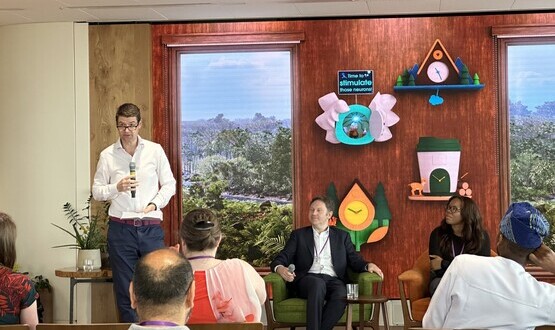The CCIO profile: Shane McKee, Belfast HSC Trust
- 15 November 2018

This week Digital Health is speaking to Shane McKee, chief clinical information officer at Belfast Health and Social Care Trust. He offers insight into Northern Ireland’s unique health IT challenges and explains why we need to stop thinking of IT systems in the traditional sense.
When did your interest in IT begin?
I’ve always had a bit of a geeky streak since my dad got me a Sinclair ZX81 computer for my 12th birthday. A whole 1K of RAM! I learnt to program it and recorded the games I had written onto cassette tapes, which I sold to my friends at school.
Years later as a junior doctor I found space for a Psion Series 3 personal organiser (remember those?) in my white coat pocket (remember those?), and I wrote a little app called WardRound to help me and my colleagues keep track of our patients. This turned into WardFive and Client-L with the Psion Series 5, but our fledgling company Palmaris Medical Ltd wrapped up when Psion decided to stop making handheld computers.
That was in the late 90s, early noughties, and to be honest I thought we would have been a lot further on with health IT by now.
How did you become a CCIO within Health and Social Care in Northern Ireland (HSCNI)?
My love for computers was part of the reason I chose the specialty of clinical genetics – all that tantalising DNA and family data to analyse. When Northern Ireland started the process of putting in place a regional electronic care record (NIECR), I became involved as the clinical lead within Belfast Health and Social Care Trust.
There was a recognition in Northern Ireland’s Health and Social Care Board that we needed to capitalise on this work (a successful IT-in-healthcare project – they do exist), and each of our five trusts was funded for a chief clinical information officer for a day per week.
I felt this was something I could bring value to.
What is the most challenging part of the CCIO role?
I think the main challenge is maintaining an overview across an organisation of over 20,000 people and several hundred IT “solutions” in that relatively small amount of time.
Of course, there are other people in our trust – with and without digital in their job descriptions – who have a great deal of skill and commitment, and who can help. So much of the challenge is bringing that diverse skill, energy and desire together into something that can deliver real improvement for patients and staff alike.
That is why I established the Clinical Digital Forum within the trust, to identify the people with the ideas and the drive, and allow them to network and form a nucleus of digital innovators and improvers.
Within your organisation, what is the most significant digital achievement of the past 12 months?
Probably getting things set up for Encompass – this is the name we have given to a Northern Ireland shared electronic health and care record taking in secondary care and community services. We’re currently in the process of selecting a supplier to work with us on it.
What’s the largest barrier the NHS and HSCNI face overall in achieving digital transformation?
Digital transformation is a change process, and with any process of significant change the biggest barrier is people, just as it’s people that are critical to success. However, another major barrier is that clinical data exists in many separate silos, and historically there has been a failure to embrace open data standards such as OpenEHR.
We need to move away from thinking of IT systems and towards designing an architecture based on open platforms, where the data and the applications are kept distinct, and Open APIs [application programming interfaces] exist in the middle to join things up. And then we have to redesign clinical processes.
How does the health IT landscape in Northern Ireland compare to that faced by the NHS in England?
It’s a tale of good news and bad news. The good news is that we have had a hugely successful regional implementation of the NI Electronic Care Record (based on software from Orion) which has opened the eyes of clinicians and patients alike to the benefits of data sharing.
However, investment has been historically much lower, and with the absence of government in Northern Ireland, senior political decision making is non-existent. So we are looking very enviously across the Irish Sea at Matt Hancock’s recent announcement of his vision for technology in healthcare, particularly the emphasis on open standards and interoperability.
Another difference is that we are comparatively unified, and there is at least conceptual agreement on a “Once for NI” policy by which individual trusts try to think regionally when making decisions.
We definitely need a government back though, especially as we stare down the barrel of Brexit, which could do significant harm to several cross-border initiatives.
What will be the most significant development in health and care in Northern Ireland over the next 12 months?
I’m going to go back to our Encompass project for this – completing procurement and building the architecture for implementation presents us with quite a hill to climb, particularly since we are taking over 60,000 staff across the region, and 1.8 million citizens, with us.
We also have major pieces of work ongoing to procure a regional lab information management system and a radiology PACS system, so getting these projects to frictionlessly mesh their cogs is a top priority.
If you were given £30 million to spend on digital transformation within your trust, where would that money go?
You’ll not be surprised to hear that part of it would go on putting an Open Platform architecture in place, and then I would launch on a relentless campaign to decommission legacy systems and port the functionality across to that open platform.
This would require a team of developers to write software in-house, but I would also want to target small and medium enterprises in our local ecosystem to work with staff and patients to develop lightweight apps that simplify work processes for our staff and provide citizens with access to their data.
I would use some of the money to back-fill clinical posts, as I would need to take the brightest and best out of their day jobs, even temporarily, to design new care processes that really deliver, and then provide the leadership to implement.
As a geneticist/genomicist, I would also bring DNA analytics into a much earlier phase of the care process, particularly for children. An Institute of Digital Healthcare would be nice too. How much change does that leave me with?
What is the most over-hyped digital innovation in health?
Speech recognition. I don’t think it’s just my County Tyrone accent that Alexa has trouble with. The various dictation “solutions” that have been developed over the past 20 years are pretty woeful and can’t take the place of a good secretary, or even most clinicians typing with two fingers. Maybe its day will come when it’s able to distinguish dictation from workflow tasks.
What’s the worst job you’ve ever had and why?
For a student summer job I worked in stock control at a ladies’ underwear depot. I think that spoiled lingerie for me forever, and now there’s no way back.
If you could have any other job, what would it be?
When I was five I wanted to be an astronaut and fly rockets to the moon like Neil Armstrong. Some things never change.
What’s the background image on your phone?
A photo I took of a boat on the Sea of Galilee at twilight. I love to head back out to Israel-Palestine from time to time to cycle in the region to raise money for the Nazareth EMMS Hospital where I did my elective in 1993.
A group of us are heading out again in March 2019, and we have room for a few more! I’ll be strapping a Raspberry Pi to my bike and taking it down to the Dead Sea for the data.
What’s the last TV series you binge-watched?
Star Trek Discovery. Fun distraction while doing the ironing.
If you could travel back in time to meet one person, who would it be?
Akhenaten, the heretic pharaoh of Egypt in the 18th Dynasty.
In a film of your life, who would play you?
Christian Bale, but he’d need to shave.




